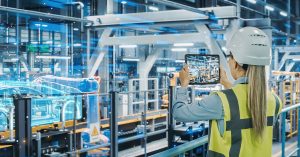The rate of change in the technology sector has always been rapid. According to McKinsey & Company, as much as ten years’ worth of e-commerce growth might have been compressed into just three months in late 2019, and the next decade will see more technological innovation than the previous 100 years combined.
Any change may be frightening, and keeping up with advances is especially so. Part of the issue is determining which improvements are the most significant and which are unlikely to bear fruit.

According to McKinsey, these are the ten top technologies that are capturing the interest and funding of investors and technologists. They are also the most likely to play a key role in the modern workplace’s evolving landscape. Understanding the influence of these technological trends on organisations and the individuals whose jobs will be affected could be critical to averting the worst consequences of the disruption that may occur.
1: Process automation and virtualisation:
As next-level process automation and virtualisation grow more ubiquitous, almost half of all present work tasks could be automated over the next few decades.
By 2025, more than 50 billion devices will be connected to the Industrial Internet of Things (IIoT),” according to McKinsey estimates. Robotics, automation, 3D printing, and other technologies will generate approximately 79.4 zettabytes of data each year.
2: The Future of Connectivity:
Faster digital connections, enabled by 5G and IoT, have the potential to boost economic activity. Implementing speedier connections in “mobility, healthcare, manufacturing, and retail could increase global GDP by $1.2 trillion to $2 trillion by 2030.” 5G and IoT will be among the most closely studied technology trends during the next decade.
Increased network availability and capability will cause significant changes in the corporate landscape, ranging from factory digitisation (by wireless control of mobile tools, machines, and robots) to decentralised energy distribution and remote patient monitoring.
3: Next-generation computing:
McKinsey believes that next-generation computing will help uncover answers to challenges that have plagued science and society for years, unlocking enormous capabilities for enterprises.
It covers a slew of far-reaching innovations, ranging from quantum AI to completely driverless vehicles, and so will not be a pressing problem for all organisations. “Preparing for next-generation computing requires identifying whether you’re in a first-wave industry (such as finance, travel, logistics, global energy and materials, and advanced industries),” McKinsey says, or “whether your business relies on trade secrets and other data that must be safeguarded during the shift from current to quantum cryptography.
4: Applied artificial intelligence (AI)
AI is one of the most important technology trends. We are still in the early stages of developing artificial intelligence. As technology advances, it will be used to create new technological tools, such as training machines to recognise patterns and then act on what it has discovered.
By 2024, AI-generated speech will account for more than half of all human-computer interactions. Companies are still looking for methods to utilise AI efficiently, according to the consultancy: “While any company can benefit from AI if it is applied effectively and consistently, less than one-quarter of respondents report significant bottom-line impact.
5: Future of Programming:
Prepare for Software 2.0, in which neural networks and machine learning write code to generate new software. “This tech trend makes possible the rapid scaling and diffusion of new data-rich, AI-driven applications,” according to the consulting firm.
In part, it could result in the development of significantly more powerful and capable software programs than are currently accessible. However, it will allow for the standardisation and automation of existing software and coding processes.
6: Trust Architecture:
In 2019, around 8.5 billion data records were hacked. Despite breakthroughs in cybersecurity, criminals continue to step up their attempts. Trust architectures, an emerging technology trend, will aid in the fight against cybercrime.
Distributed ledgers, such as blockchain, are one method for developing a trust architecture. “In addition to lowering the risk of breaches, trust architectures reduce the cost of complying with security regulations, lower the operating and capital expenditures associated with cybersecurity, and enable more cost-efficient transactions, for instance, between buyers and sellers,” the consulting firm states.
7: Bio Revolution:
There’s a “confluence of advances in biological science” whose arrival “promises a significant impact on economies and our lives and will affect industries from health and agriculture to consumer goods, energy and materials.”
The bio revolution, powered by AI, automation, and DNA sequencing, promises the creation of gene therapies, hyper-personalized pharmaceuticals, and genetics-based food and exercise recommendations. These technological advances will provide new markets, but they will also raise significant ethical concerns. “Organisations must examine their bQ, or biological quotient, which refers to how well they grasp biological research and its ramifications. They should then sort out the resources they need to commit to biological technologies and capabilities, and whether to integrate those into their existing R&D or partner with science-based start-ups,” McKinsey said say.





